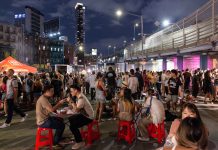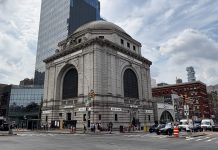

This story was written by Zach Williams.
Controversial Chinatown bus operator Fung Wah needed to say little in order to garner support from a Community Board 3 committee to resume operations on the Lower East Side later this year.
The company along with fellow carrier Lucky River gained approval from the C.B.3 Transportation and Public Safety Committee April 22 with the stipulation that they wait until upcoming street improvements are finished before setting up shop at 139 Canal St. Once they do, their buses must get in and out of the borough as quickly as possible via the Manhattan and Willamsburg bridges, the committee decided. But the idea to wait did not arise from the committee itself but rather from Lucky River representative Ka-Yung Wong.

He told the committee that safety improvements were necessary before buses could safely operate there. His counterpart from Fung Wah, meanwhile, sat quietly in the audience. The meeting assumed a strange dynamic when Wong, Lucky River’s attorney, took on the role of safety advocate. a move meant to did so in order safeguard the company should a crash involving the company’s fleet ever occur near the proposed site.
“The major concern is safety so what I’m proposing is do whatever we can to make sure the whole area is safe,” Wong said.
Lucky River wants the new location so that it can consolidate bus loading on Chrystie Street and ticket operations on Canal St., Wong said. However, speeding vehicles and dangerous pedestrian crossings near the Manhattan Bridge are of particular concern. He suggested the installation of signs in the area urging drivers to slow down. Barriers should also be erected in order to deter pedestrians from walking onto a traffic triangle located between The Bowery and Canal St. which lacks a crosswalk, he added. These types of recommendations, committee members said, went beyond the scope of the application.
Both applicants said about 20 buses would operate from the location at 139 Canal St. each day with a lull during the early morning hours. They would also use more modern vehicles that pollute less, according to documents posted on the C.B.3 website. After a half-hour of further discussion, the committee appeared poised to approve the applications without any provision to wait until safety improvements.
But then committee member Chad Marlow said he could not vote in favor of such a resolution since Wong himself acknowledged that the area was not safe for buses. His colleagues on the committee maintained that he had not heard Wong correctly until the attorney reiterated his contention that the area was too dangerous.
Colleen Chattergoon, a representative of the city Department of Transportation (DOT), had just told the committee that plans to improve the streetscape there would be announced in May, so, Marlow suggested, a delay made sense.
“DOT is preparing to make it safer. (Wong) wants to make it safer. Let’s make it safer … We’re talking of a delay of a few months,” Marlow said in reference to the application.
Chattergoon did not provide specific details of DOT’s planned improvements but did hint that they would likely start this summer and conclude in the fall. She noted that Fung Wah had operated there in the past without any issue.
The company was a pioneer of the Chinatown bus industry, which began as a means for Chinese-American parents to visit their children Boston-area colleges in the late 1990s. But in the subsequent years, Fung Wah came under fire for its safety record following high-profile crashes. The Federal Motor Carrier Safety Administration ordered the company to cease operations in 2013 stating that it did not properly maintained its fleet, falsified inspection records and failed to maintain safety standards for its drivers. The administration decided late last year to let Fung Wah resume operations.
A Fung Wah representative spoke at the meeting, asserting in Chinese that the company worked without issue on Canal Street in the past until “government agencies” began “picking on them,” according to the interpretation made by committee member Karlin Chan. There was no finding of wrong-doing, the representative said. That statement drew a quick rebuke from CB3’s David Crane, who said the company should not whitewash its past given the past federal shutdown order. Fung Wah did not make any more comments at the meeting except to accept the committee’s stipulations.
Resident complaints about the growing presence of curbside buses in the Lower East Side spurred C.B.3 to request in March that the DOT deny new permits for stops in the area roughly bounded by East Broadway, and Rutgers, Allen and Hester streets. The proposed stop at 139 Canal St. would not fall within that area.
Nonetheless there was some opposition to the applications of Fung Wah and Lucky River at the April 22 committee meeting. SPaCE block association leader Emma Culbert said 139 Canal St. was an improper place for a bus stop, especially considering the tendency for vehicles to idle in hot and cold winter, and speed, as well as the implications for traffic congestion in the surrounding neighborhood.
“Those buses are going to be flowing all over the neighborhood,” said Culbert. Her comments spurred committee member Chan to propose the stipulation that the companies move between the two bridges via Bowery in order to minimize their impact on other streets.
The resolutions in support of the applications will face a vote by the full C.B.3 board at its meeting scheduled for 6:30 p.m. tomorrow night at 166 Essex St.









